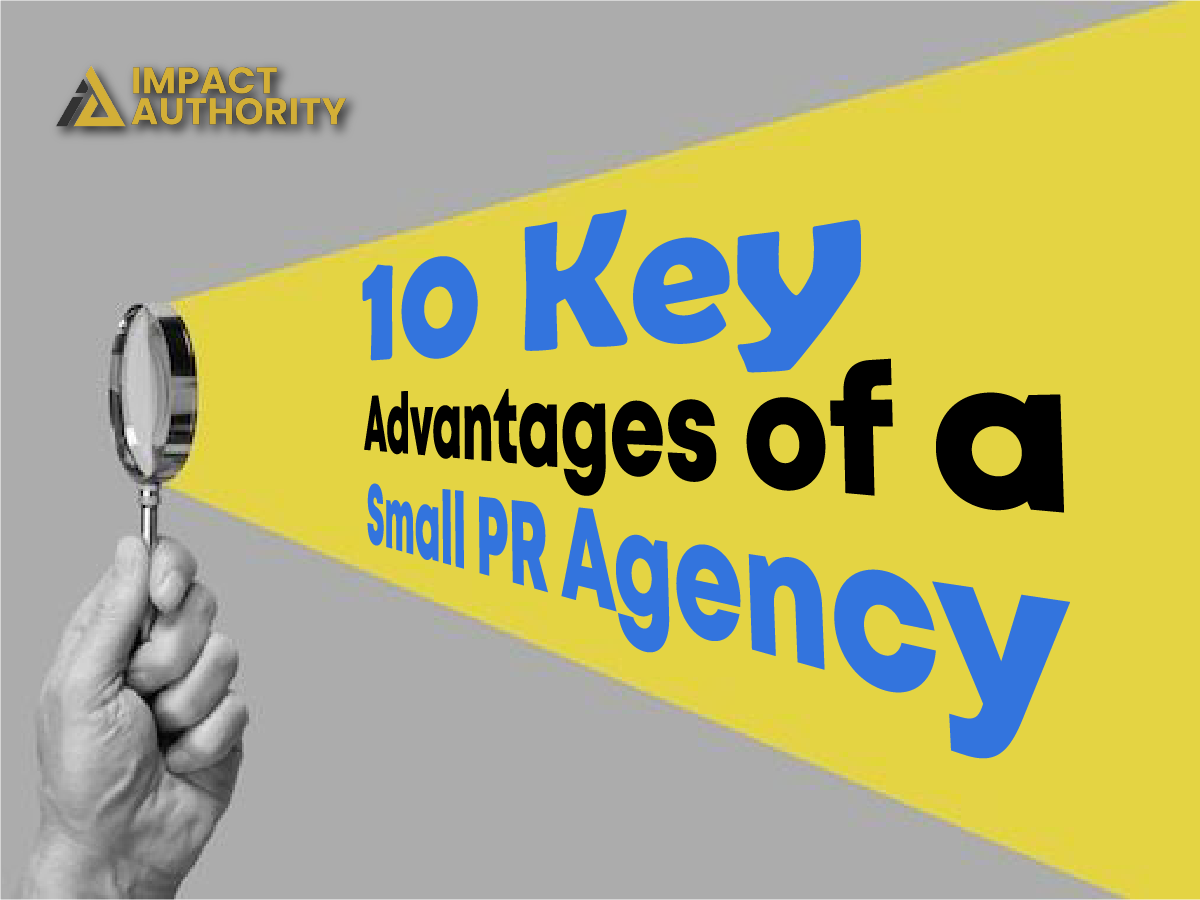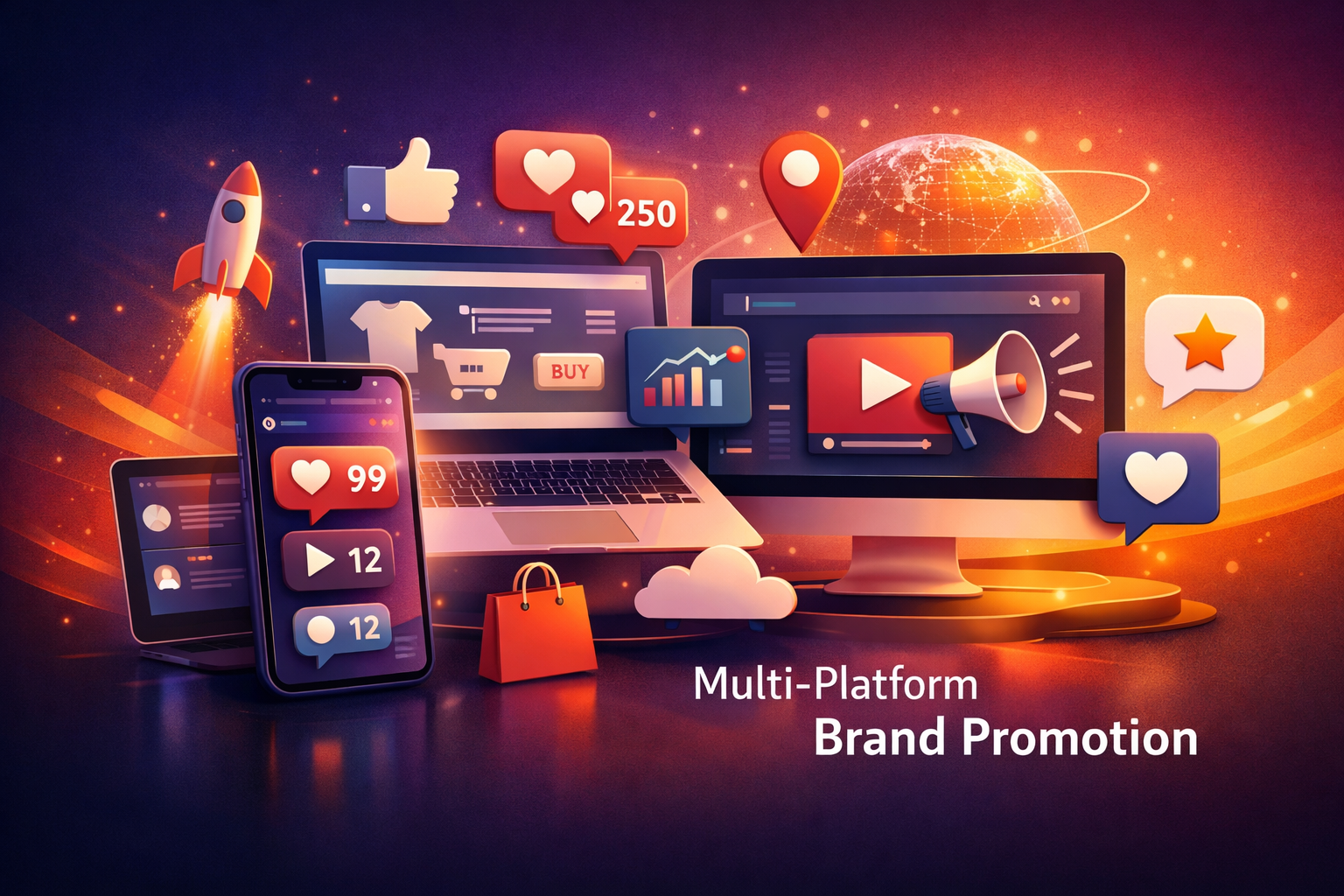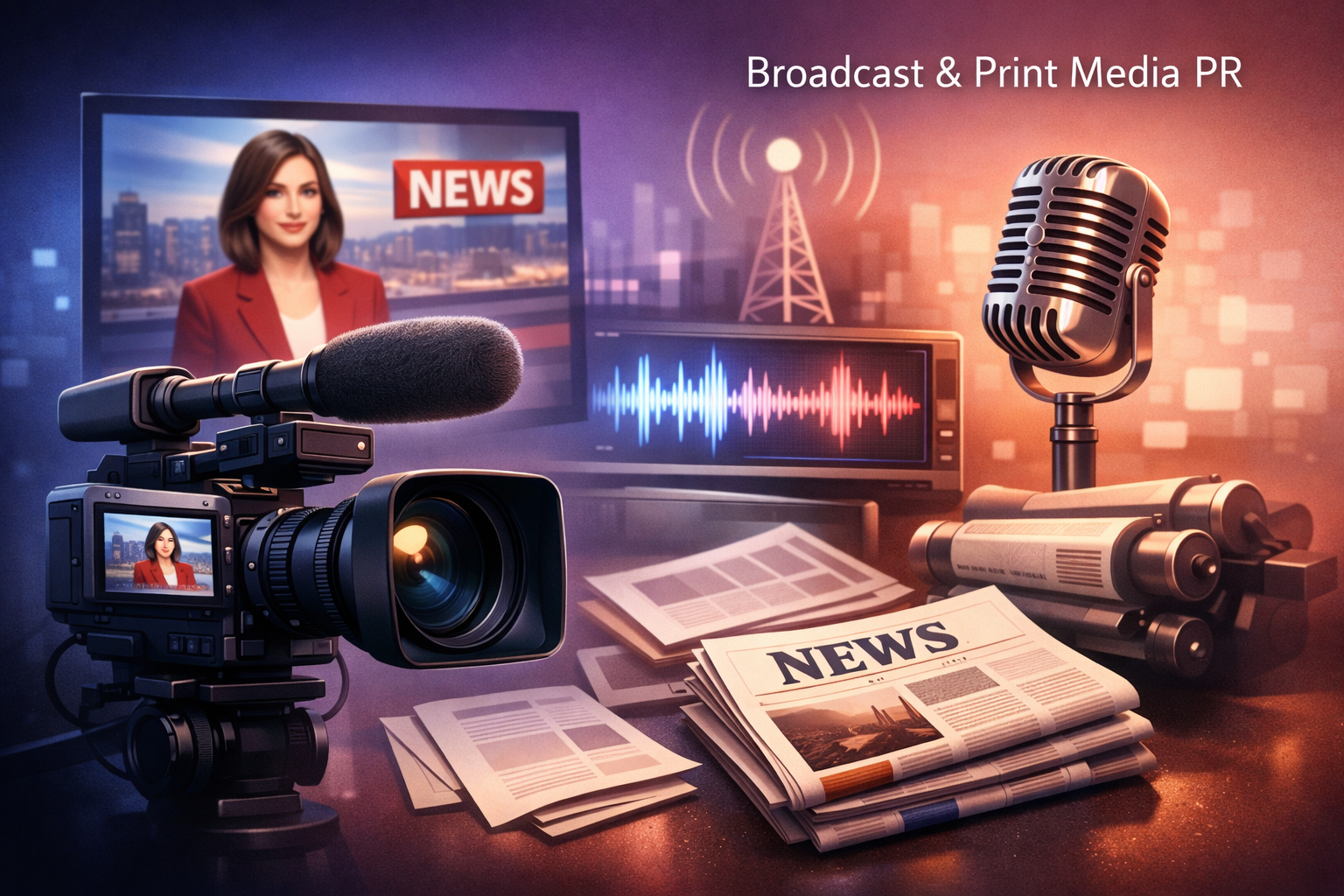What do breakout brands know that you don’t? Small PR agency advantages that rewrite the rules of visibility and impact.
Small PR agency advantages are often overlooked, but that’s exactly why they’re so powerful. In a world where bigger usually means better, many companies instinctively reach for the largest, most well-known agencies. After all, big names carry big promises, right?
But what if the very size you’re paying for is what’s keeping your brand from getting the spotlight it deserves?
The truth is, boutique PR firms and small, agile communications teams are rewriting the playbook and doing it quietly. They’re winning attention for startups, creative brands, and even challenger enterprises by using strategies that feel more human, more targeted, and, frankly, more effective. They aren’t bound by layers of red tape. Instead, they act fast, pivot quickly, and offer something you rarely get with a giant PR machine: real attention.
Still wondering what makes smaller PR partners not just “good enough,” but possibly the smarter choice? That’s exactly what we’re diving into.
From faster response times to personalized media outreach and cost-effective innovation, this article unpacks every edge these lean, focused teams bring to the table and why, in today’s media landscape, they may be the game-changer your brand has been missing.
Key Advantages of Choosing a Small PR Agency
Photo by SEO Galaxy on Unsplash
A small PR team collaborating closely, showcasing the hands-on approach boutique agencies bring to every campaign.
So, what exactly are the small PR agency advantages that have brands, from disruptive startups to savvy mid-size companies, ditching bloated retainers and chasing leaner, sharper results?
Here’s the deal: small doesn’t mean less. It means focused, personal, agile, and often more creative. These agencies are built differently, and for many modern brands, that difference is a massive win.
Below, we break down the 10 most powerful reasons why small PR teams are not only thriving but outperforming their larger counterparts across the board.
Let’s dig in:
1. Direct Access to Leadership (No Middlemen, No Misfires)
When you hire a boutique PR agency, you’re not shuffled through layers of account managers or junior staff. You’re in direct contact with the decision-makers. That means:
- Faster communication
- Sharper strategy alignment
- Experienced hands crafting your message
Unlike large firms where juniors often lead execution, small agencies place you in the room with their A-team—every time. That alone can elevate the quality of your campaigns.
Did you know? A 2023 Cision report found that 68% of PR clients preferred agencies where senior staff were directly involved in the work.
2. Agility: Turning on a Dime
Small PR agency advantages shine brightest in fast-moving situations. Whether you’re responding to breaking news or launching a time-sensitive campaign, smaller firms are built for speed.
They can:
- Approve and execute strategies in hours, not days
- Adjust messaging quickly as situations evolve
- Say “yes” to new ideas without bureaucratic drag
This nimbleness is not a luxury; it’s often the difference between relevance and radio silence.
3. Customized Service That Feels Like an Extension of Your Team
Forget cookie-cutter solutions. Small PR agencies tailor everything. Their survival depends on results, not just billable hours. That means:
- Strategies built around your brand’s voice and values
- Closer collaboration with internal teams
- Proactive ideation based on your specific goals
You’re not just another logo on the wall; you’re a partner.
4. Cost-Efficient Without Cutting Corners
Let’s talk numbers. Smaller PR agencies typically have lower overhead. No sprawling offices, no layers of executive payroll. That translates to:
- More competitive pricing
- Higher ROI for campaigns
- Greater flexibility with project-based work
They focus on lean, efficient strategies that punch above their weight.
According to PRWeek, clients switching from large to small agencies reported up to 30% savings in annual PR spend, without losing quality.
5. Deep Niche & Local Expertise
Many boutique agencies are hyper-focused. They know your industry or region inside and out. This brings:
- Stronger media relationships in your niche or locale
- Intuitive understanding of audience behavior
- Better story angles and placement success
When you need a pitch that lands, this insider knowledge becomes priceless.
6. Creative Risk-Taking (The Good Kind)
Without layers of red tape, small PR teams are free to think boldly.
They brainstorm fast, pitch unconventional angles, and try what others won’t.
When bold thinking meets the freedom to move fast, the results often break through the noise.
A standout idea doesn’t need 15 approvals. It just needs courage and clarity, two things small agencies bring in abundance.
7. Long-Term Relationship Building
Small PR agencies grow with their clients. They’re invested in your brand beyond the campaign.
Expect:
- Personalized check-ins
- Strategy sessions that reflect evolving needs
- A team that truly “gets” your vision
They build relationships, not just retainers.
So, Is a Small PR Agency Right for You?
Let’s be honest. Not every brand needs a big agency. If you value speed, personalized service, niche expertise, and cost-effective brilliance, a small PR agency might just be your secret weapon.
But don’t just take our word for it. Vet potential partners. Ask for case studies. Meet the team. The proof is always in the execution.
Red Flags: When a Small PR Agency Might Not Be the Right Fit
Small PR agencies offer incredible advantages, but they’re not a universal fit. Just like any partnership, success depends on the match. So, before you dive in headfirst, here are a few signs that a boutique agency might not align with your needs right now.
You Need 24/7, Global Coverage Across Multiple Time Zones
If your brand operates worldwide and needs immediate support across continents—say, a product launch in New York and a media crisis in Singapore—then a boutique firm may not have the bandwidth.
Most small PR agencies operate lean, focusing on one region or time zone. They’ll deliver high-quality work, but they aren’t equipped for constant, round-the-clock engagement like a global agency with teams in every market.
So, if you’re handling crisis PR at 3 a.m. in Tokyo while juggling a product launch in New York, you may need a larger agency with true global infrastructure.
You’re Expecting Constant Mass-Market Coverage
Let’s be honest—weekly front-page coverage in major media outlets isn’t how earned media works, no matter which agency you hire. If you’re aiming for massive, high-volume press campaigns, that’s usually the realm of a large firm—one with an extensive media network and the team power to pitch hundreds of outlets at once.
Small agencies excel in targeted, meaningful coverage—but if scale and speed are your top priorities, you might find their laser focus too limiting.
You Require Deep Legal or Regulatory Expertise
Need crisis comms wrapped in legalese? Or campaigns that pass rigorous compliance checks across multiple jurisdictions? Then you’re likely going to need the muscle of a full-service PR and legal team.
Boutique agencies may have trusted partners they loop in when necessary, but they typically don’t house in-house legal teams or regulatory specialists. If your industry is heavily regulated—like finance, healthcare, or defense—you’ll want to ensure those boxes are already checked.
You Prefer a Completely Hands-Off Approach
One of the biggest advantages of working with a small PR agency is the high level of collaboration—but that’s a two-way street. These teams thrive when you’re involved. Not by micromanaging, but by actively sharing feedback, business goals, and the insider insights only you can provide.
If your ideal approach is more “set it and forget it,” you might feel disconnected. A Digital PR Team within a small agency does its best work when treated like an extension of your own company not just another outsourced service.
Digital & Influencer Integration: Modern PR Beyond Traditional Media
Gone are the days when PR meant just newspapers and press releases. Today, the smartest boutique agencies know how to blend digital storytelling, influencer marketing, and traditional media into one cohesive strategy.
Let’s break down how modern PR teams, especially small, agile ones, are making a bigger impact by thinking beyond the pressroom.
Personalized, Platform-First Pitches
Small PR teams don’t just send generic blasts to journalists. They study what’s trending, where your audience lives (TikTok? YouTube? Threads?), and tailor every pitch with context.
Similarly, Impact Authority applies a platform-first mentality—designing TikTok-friendly story hooks, aligning with niche influencers, and creating thought-leader content on LinkedIn, all to maximize earned visibility across channels.
- Want to launch a new skincare product? Your pitch might start as a TikTok idea with a PR hook, not a press release.
- Have a founder story? That could land better as a LinkedIn carousel with media pickup baked in.
Micro-Influencer Partnerships That Actually Convert
Big agencies may favor A-list names. Boutique firms? They go local. They go real.
- A fitness brand might team with 10 niche creators in the wellness space for a product drop.
- A mental health startup might work with peer advocates or TikTok therapists who already have built-in trust with a targeted audience.
These creators may not have millions of followers, but they move the needle.
Seamless Integration with Digital Channels
Great modern PR doesn’t live in a vacuum. Today’s small agencies often work shoulder-to-shoulder with:
- Your SEO or content team (for keyword-aligned pitches)
- Your email marketers (to repurpose coverage as social proof)
- Your paid media buyers (for amplifying earned media via retargeting)
This holistic approach makes every piece of coverage more valuable and multi-use.
Measuring ROI: What Small PR Agencies Deliver (and How to Track It)
Image by OpenClipart-Vectors from Pixabay
We’ve already unpacked the core advantages of working with a small PR agency, faster execution, deeper collaboration, creative flexibility, and all the rest. But let’s get into the real question that follows all of that:
“How do I actually measure what I’m getting out of this?”
Because at the end of the day, great ideas and agile teams are fantastic, but results matter. And boutique PR agencies know this. In fact, many of them are laser-focused on ROI because they don’t rely on legacy brand recognition to keep clients. They rely on performance.
Here’s how to track the impact clearly and confidently, without fluff or guesswork.
1. Start with Goals That Actually Move the Needle
Before metrics, you need clarity. A good small agency won’t just ask what media coverage you want, they’ll ask what outcomes matter to your business.
Is it:
- More demo sign-ups?
- Improved brand sentiment?
- Increased share of voice against competitors?
- Website traffic from earned media?
That conversation upfront is essential. Without aligned goals, any ROI discussion is just numbers in the dark.
For instance, Impact Authority emphasizes goal-driven PR planning, defining metrics like demo leads, referral traffic, or share of voice before launch. This ensuring reporting reflects meaningful impact, not vanity metrics.
2. Track KPIs That Tie Directly to Business Outcomes
Small PR agencies tend to report with more relevance, fewer vanity metrics, more actionable ones.
Here are a few smart KPIs worth watching:
- Earned media coverage (quality > quantity) – Think relevance of publication and audience match, not just name-drop headlines.
- Referral traffic – Are people clicking from PR placements to your site?
- Lead or demo requests – Did coverage actually drive co+nversions?
- Share of voice – Are you getting mentioned more often than competitors?
- Sentiment analysis – Is the tone positive, neutral, or negative?
Agencies that value ROI will tailor these to your business—not hand over a generic report filled with media impressions that mean nothing to your bottom line.
3. Reporting That Actually Tells a Story
Here’s where small PR shops often shine: they don’t just hand you data—they walk you through it. Expect real conversations, not just PDF reports with a dashboard of numbers.
You might get:
- A monthly or bi-weekly email summary
- Narrative context: “Here’s what we tried, what worked, what’s next”
- Quick feedback loops that lead to smarter pivots
Big agencies often drown you in slides. Small ones tend to show you results with insight.
In essence, if you’re working with a small PR agency, or thinking about it, don’t just ask for press. Ask how they’ll track success. Ask for KPIs that tie to your goals. Ask for context, not just data.
Because the right small PR team won’t just talk about impact, they’ll prove it. And they’ll give you the tools to see it clearly, campaign after campaign.
The Big Power of Small PR Teams: Real Strategy, Real Wins
Small agencies are masters of something the big guys often miss: attention. They notice the details. They get your tone. They read the room. They keep their finger on the pulse of the market, and they adapt fast when things change.
If you need to pivot, they’ll make it happen. Or when you want bold ideas, they’re not afraid to take a swing. Because they’re not just chasing headlines. They’re creating them.
Let’s also talk about communication. When you work with a smaller team, everything just flows smoother. You get quicker responses, clearer updates, and most importantly—you feel heard and understood. There’s no need to navigate through layers of corporate hierarchy. It’s straightforward: real conversations, real strategy, and real results.
If you’ve been equating size with success, it’s time to shift your perspective. That’s the value of specialized PR consultancy services like those offered by Impact Authority. As a boutique PR firm, they’ve landed clients in top-tier publications such as Forbes, Nasdaq, and MSN all through focused strategy and fast execution.
Because in today’s noisy media landscape, the smartest move isn’t to shout louder. It’s to partner with experts who know how to make your message resonate. That’s the true power of personalized, high-impact PR consultancy services—and the magic of going small.
How to Choose the Right PR Agency: A Step-by-Step Checklist
Photo by Izabela Krakowska on Unsplash
PR team member working with focus, what sets boutique PR teams apart in delivering personalized support.
By now, you might be thinking: “This all sounds great, but how do I actually choose the right PR partner for my brand?”
You’re not alone. Many businesses get stuck here, not because they don’t care, but because the choices can be overwhelming. Big agency? Boutique firm? One-person consultancy?
Here’s the good news: making the right decision doesn’t have to feel like guesswork. A structured approach will save you time, money, and potential frustration. So let’s simplify it.
Step-by-Step PR Agency Selection Checklist
Use this practical checklist to filter through the noise and find a team that aligns with your goals, style, and expectations:
1. Define What Success Looks Like
Before you even reach out to agencies, get clear on what you’re hoping to achieve.
- Do you need earned media coverage or brand storytelling?
- Are you launching something new, managing a crisis, or rebranding?
- Is your goal more visibility or more qualified leads?
2. Set a Realistic Budget Range
This sets the tone. You don’t need to know the exact spend, but knowing your range helps you avoid misaligned conversations.
- Retainers vs. project-based?
- Will you need monthly reporting or additional digital support?
- Be transparent—small agencies are often flexible.
3. Ask the Right Questions
This is where most brands miss the mark. Go deeper than, “Who are your past clients?”
Ask:
- Will I be working directly with senior staff?
- How do you handle urgent or crisis PR situations?
- What experience do you have in my industry?
- Do you have international or multilingual capabilities if needed?
4. Score Each Agency (Yep, Like a Rubric)
Treat it like a decision matrix. Create a shortlist and rank each firm based on:
- Cultural fit
- Relevant experience
- Response time and communication style
- Reporting clarity
- Creativity of the initial pitch or proposal
Tip: Keep a shared doc or scoring table handy so your team can weigh in, too. The best choice will feel aligned both on paper and in your gut.
Decision-Making Framework: Small vs. Large PR Agencies
| Criteria | Small PR Agency | Large PR Agency |
| Speed & Agility | Approves strategy in hours | Slower due to hierarchical layers |
| Cost Efficiency | Advertises AI tools; saves ~58% on reports, Empathy First Media | High retainers, more admin overhead |
| Personalization | Custom messaging, direct leader access | Template-led, less flexible |
| Media Reach | Strong local/niche contacts | Broad but diluted global coverage |
| Innovation | Adopts AI tools (33% small biz use AI) | Often risk-averse, slower to adapt |
Frequently Asked Questions (FAQs)
Q1: Are small PR agencies suitable for large brands?
Absolutely. Many large brands work with boutique firms for specific campaigns, local outreach, or niche markets. It’s about fit, not size.
Q2: Will I get enough media coverage with a small agency?
Yes—and often more targeted coverage. Small agencies typically have strong relationships with specific media segments and can tailor pitches more effectively.
Q3: How do small PR firms manage crisis communication?
Swiftly. Their lean structure allows for immediate mobilization. You’ll likely get faster response times and more direct involvement from senior leadership.
Q4: Do small PR agencies handle digital and influencer PR too?
Most do. In fact, many boutique agencies are ahead of the curve when it comes to digital, social media, and influencer partnerships because they embrace innovation.
Q5: How do I vet a small PR agency?
Ask about:
- Past clients and campaigns
- Industry expertise
- Who you’ll be working with directly
- Flexibility in scope and pricing
Always request references and a strategy outline before committing.
Final Thoughts: The Big Edge of Going Small
Let’s be honest. The PR world loves size. Big firms. Big clients. Big teams. But here’s the thing, bigger isn’t always better.
In fact, small PR agencies have a huge edge. And it all starts with how they work.
They don’t try to be everything to everyone. Instead, they focus. They go deep. They stay close to what really matters: people, purpose, and performance.
There’s no red tape. No endless layers of approval. No getting passed off to someone new every few weeks. What you get is a tight team that’s all in. They care about your goals because your wins are their wins too. It’s not just a partnership, it’s true alignment. And it shows.




